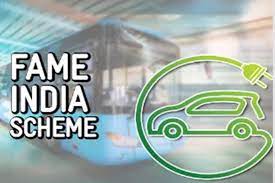FAME II Scheme : Extended

The Parliamentary Standing Committee on Industry has recommended extending the Faster Adoption & Manufacturing of Electric Vehicles (FAME) – II Scheme by at least three more years.
- The committee suggests broadening the scope of the FAME-II Scheme to support more electric vehicles, making it more inclusive.
- The committee recommends restoring subsidies on electric two-wheelers
- The committee advises increasing the number of electric vehicles supported in the four-wheelers category and including private electric four-wheelers in the FAME II Scheme, with a cap based on the cost and battery capacity of the vehicle.
- The committee suggests incentivizing the installation of charging stations and extending support to individual investors, women’s self-help groups, and cooperative societies.
- It also recommends allocating more funds to entities like Bharat Heavy Electricals Limited (BHEL) to popularize EV mobility.
- There is a need for a consistent and stable national policy on electric mobility.
FAME Scheme:
- FAME India is part of the National Electric Mobility Mission Plan, aiming to encourage electric vehicles through subsidies across all vehicle segments.
- Phases of the Scheme Phase I started in 2015 and completed on March 31, 2019.
- Phase II started in April 2019 and concluded on March 31, 2022.
- Technologies Covered Hybrid and electric technologies, including Mild Hybrid, Strong Hybrid, Plug-in Hybrid and Battery Electric Vehicles.
- Monitoring Authority is Department of Heavy Industries, Ministry of Heavy Industries and Public Enterprises.
- Focus Areas of the Scheme is Technology development; Demand creation; Pilot projects; Charging infrastructure
- Objectives of the Scheme Encourage faster adoption of electric and hybrid vehicles through upfront incentives; Establish necessary charging infrastructure for electric vehicles.
- Features of Phase II of FAME Emphasis on electrification of public transportation, including shared transport; Incentives primarily for vehicles used in public transport or registered for commercial purposes; Benefits extended to vehicles with advanced batteries like Lithium-Ion batteries.




